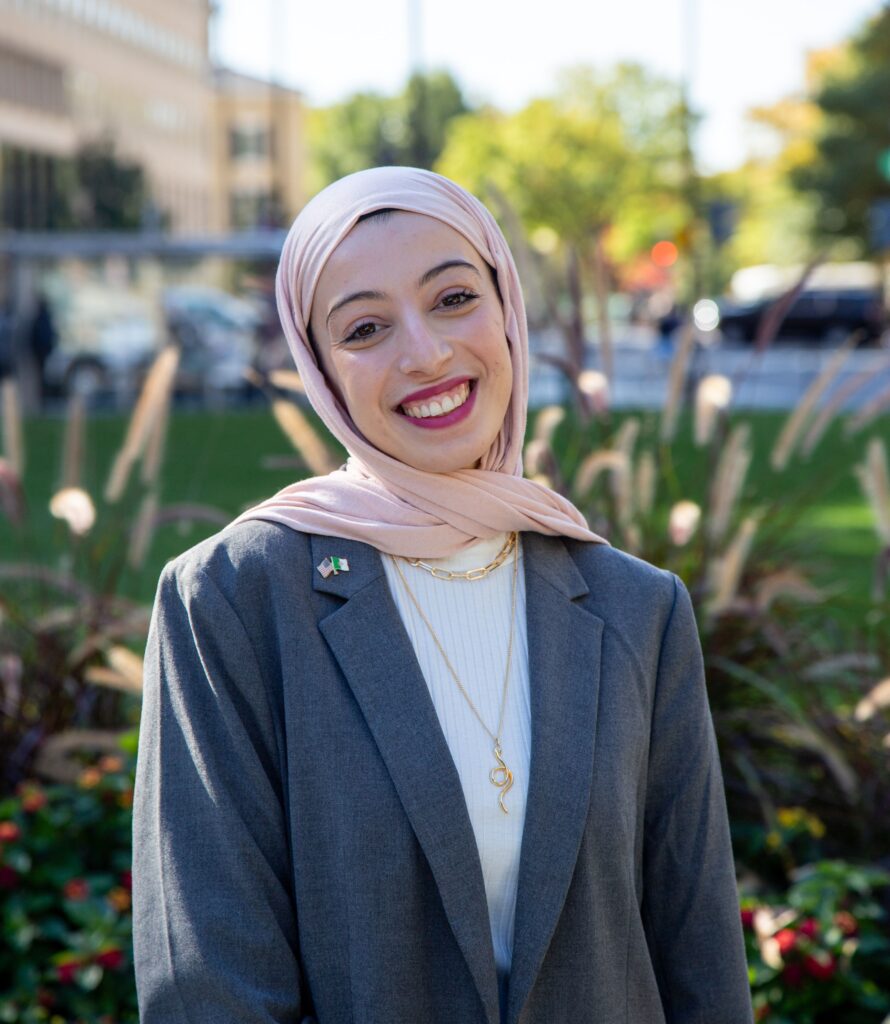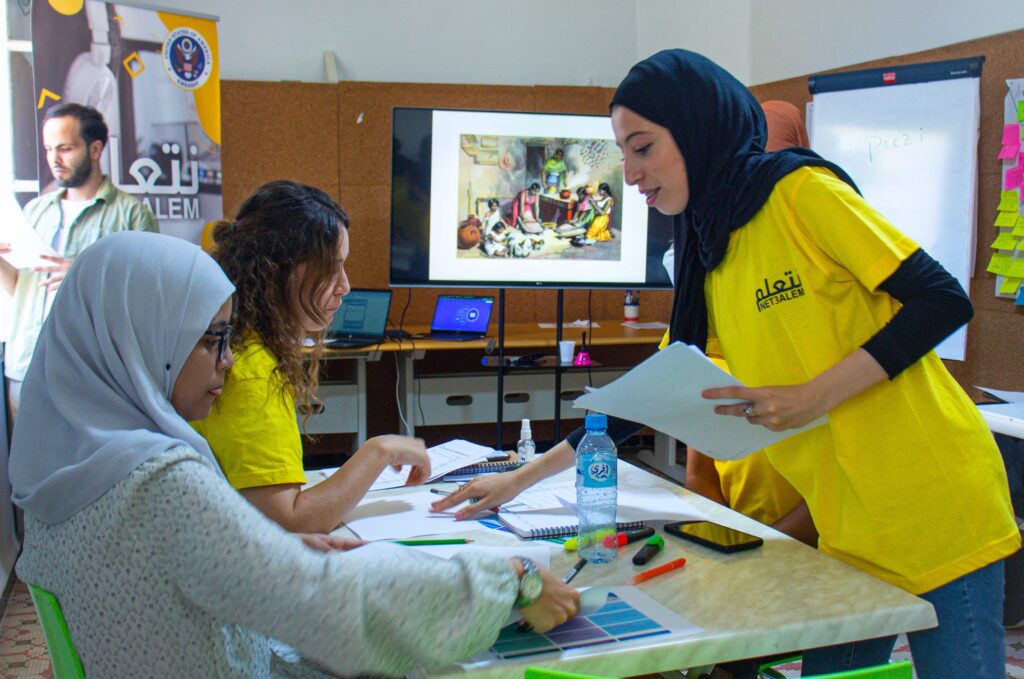-
What We Do
- WHERE WE WORK
-
About Us
 Welcome Message from Carol Jenkins
Welcome Message from Carol JenkinsFor more than 90 years, World Learning has equipped individuals and institutions to address the world’s most pressing problems. We believe that, working together with our partners, we can change this world for the better.
On my travels, I’ve had the opportunity to meet with many of those who have joined us in this mission. In Baghdad, we’ve trained more than 2,300 Iraqi youth who are already giving back at home. In London, our partners in the TAAP Initiative strongly believe that we are all responsible to practice inclusion. And in Vermont, our Experiment in International Living and School for International Training participants prove every day that they have the tools and the determination to change the world.
Please join us in our pursuit of a more peaceful and just world.
- Get Involved
Media Center > Story
From tech girl to tech woman, Houa Seghouani’s journey has been an endless circle of learning
February 12, 2024
By Abby Henson

In the summer of 2016, Houa Seghouani participated in an exchange program empowering girls ages 15–17 to pursue education and careers in science, technology, engineering, and mathematics (STEM). This past fall, she participated in another program supporting women leaders in STEM worldwide. This made her the first woman to complete both U.S.-based programs, a distinction that earned her a standing ovation from the other participants.
In the seven years between the two programs, Houa did not relax when she returned to her home country of Algeria. She launched a technology camp for kids, became a teacher and mentor at World Learning’s Algiers STEM Center, and founded the “Net3alem” (I Learn) platform, which provides technical training for teachers in the field of science, technology, engineering, arts, and mathematics (STEAM).
She also earned her university degree in electronics and electrical engineering and taught STEAM education in a private school before taking an internship with World Learning. This led to her working on a monitoring and evaluation project for World Learning’s 21 FREE project in Algeria until last fall, when she flew to the United States for the women leaders in STEM program.
World Learning spoke with Houa about her academic and professional journey over these past years. The conversation was at times emotional, often insightful, and always inspirational — much like Houa herself.
Can you tell us about the first STEM program you did when you were 16? What did you learn most from it?
The program was TechGirls, and it was a turning point in my life. I applied for it to explore my passion for technology. It was more than a three-week exchange — it was a confidence booster.
The program started with coding classes. But how they taught coding was different. It was very interactive. At first, we did a group activity where we gave another participant directions outside. This taught us how precise you have to be so people would not get lost. It is the same with coding programming.

For a coding project, I worked on a small game. We all could work at our own pace, which was new to me. After five days of workshops about different tech applications and leadership, the final workshop had us think of a need and then address it by creating an app. We learned how to plan the project when back in our home countries, complete with checklists and a calendar.
We also did site visits. I remember a trip to Virginia Tech. It was my first introduction to biotechnology. I had never heard about that field before!
But what I learned most is that girls can achieve anything. It showed me the power of determination and that there is limitless potential in STEM. It inspired me to be fearless in pursuing my dreams and to believe in my ability to excel in any field.
After the program, you worked on your post-program project at World Learning’s Algiers STEM Center. Can you tell us about your time at the center?
I first learned about the STEM center in Algiers while actively searching online for support to implement my TechGirls follow-up project. My project partner Cyrine and I decided to approach them for assistance. Anyone can register for the center’s workshops, so we did.
“I was very shy when I entered World Learning’s STEM center. But I became very strong. It gave me a lot of power, and that has allowed me to empower others.”
When I explained my project idea to host a youth tech camp, I learned I could use the center’s space, computers, and resources. They also helped me market the camp. They supported me from start to finish and overall allowed me to connect what I’d learned in theory and then apply it.
I was overwhelmed at how involved and supportive the center was of my academic and personal growth in the field of tech. Mohamed Abdelaziz [World Learning’s STEAM center director in Saudi Arabia who previously worked in Algeria] and his team provided unwavering support and belief in my project, which gave me confidence. I was exposed to new things because there were people there always supporting and encouraging me.
This experience marked the beginning of everything I am involved in today and was instrumental in shaping my journey.
Can you share more about the camp you ran at the center?
The project was a technology camp for students ages 10–14, designed to introduce them to the world of coding and technology. The goal was to provide them with a foundational understanding of technology and teach them how to use various applications effectively. Through this initiative, we wanted to spark their curiosity, nurture their interest in STEM fields, and equip them with some essential skills for the future.
You went on to complete training to become a teacher and mentor at World Learning’s center. What does this mean to you?
Becoming a teacher trainer and mentor was a natural progression for me, and it means the world. My journey began when I first participated in a variety of STEAM discovery activities at the center, where I was consistently impressed by the high-quality workshops — from the Lego robotics to the advanced AI Saturdays course.

This experience and the dedication of the team motivated me to become a teacher and mentor myself and lead workshops I was passionate about like Hour of Code, Arduino Electronics, and a range of virtual programs on science discovery. It’s so fulfilling to witness how a single session can significantly impact someone’s life and career choices. The effort required for mentoring is substantial, but it’s worth every moment when you see the positive changes it can bring about.
But also, teaching and mentoring have proven to be a two-way street — it all comes full circle. Training teachers and mentoring enhances my learning and understanding. I learn more because others ask me a lot of questions. In addition, you also form a new professional network with other mentors. My fellow mentor Hiba Mobarki graduated from the center’s teacher training program at the same time as me. We would plan to complement each other’s work, cover for each other when university duties called, and most importantly, put our heads together in reflection on learning and teaching. My outstanding journey in the tech field would not be possible without the support of Hiba and other fellow mentors. Again, it is that circle of giving and receiving that is so powerful.
Do you think you are an inspiration for younger girls in STEAM?
There was a girl, Sara, who participated in my camp and was inspired by me to apply to TechGirls. I told her, “Just go and try!” I stressed that if nothing else, she would learn how to do applications and interviews. She was accepted! It’s a deeply rewarding feeling to know that I played a part in shaping her aspirations.
Over seven years, I think hundreds of girls have found inspiration in my journey and are now looking to me for guidance and motivation. I now feel like I’m responsible for more people, for more girls. It’s very important for me to make all feel included and to break stereotypes.
If I can do it, they can do it!
Do you see other barriers for youth in the STEAM field?

It is not just gender stereotypes but assumptions about other content areas. For example, high school students in Algeria who study on the letters stream instead of the scientific one assume they are not able to understand STEAM content. I try to counter the notion that you need to know everything before you try or before you teach or help others. You don’t!
I had to face this fear and counter it. I learned I just had to be prepared — and remember that I always have something to teach others. It can be a beginning, a spark, to get them exposed. When I see students taking a building block and growing from that, I am so happy.
I again see it as a circle. You come to this place, you start getting exposed, and then you discover your interests. Then you teach others, which gives something to someone else. But then you learn something from your students, and it all circles around.
I was very shy when I entered World Learning’s STEM center. But I became very strong. It gave me a lot of power, and that has allowed me to empower others.
Can you tell us about the program for women leaders in STEM?
This was the TechWomen program, and it helped provide the career push and upscaling I needed as a STEAM enthusiast. The best part of the program was undoubtedly the impact project phase. This phase guided us through every step of creating a successful project with the support of coaches. What made it even more special was that our team from Algeria was the winner among seven countries, earning grant money to implement our project back home. This was a dream come true for me, as I have always wanted a guided path for planning and executing impactful projects.
The most difficult part was managing the intensity of the program. The program is a rigorous five weeks with the impact project phase happening parallel with two other phases: a professional mentorship and a cultural exchange. There were multiple events happening simultaneously, and I had to absorb a significant amount of information while trying to be productive. It was challenging but it helped me hone how to manage priorities and function effectively in stressful situations.
“You start getting exposed and then you discover your interests. Then you teach others, which gives something to someone else. But then you learn something from your students, and it all circles around.”
Overall, I gained inspiration, support, and practical experience to continue — and hopefully thrive — in the STEAM field, as well as make a meaningful impact in my community
What is next for you in the world of STEAM?
My next step is to continually improve my skills and use them to collaborate with like-minded individuals on a wide range of impactful projects in the field.
I also hope to keep teaching and empowering and instilling confidence in the next generation — encouraging them to excel in STEAM fields and pursue their dream careers.
Editor’s note: Since the time of World Learning’s interview with Houa, she has been selected as a local engagement coordinator for TechGirls in Algeria. She will assist with candidate interviews and pre- and post-departure preparations for selected girls. In addition, she will assist with their follow-up projects.





